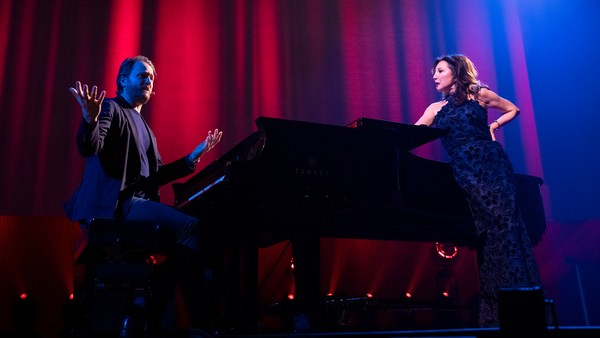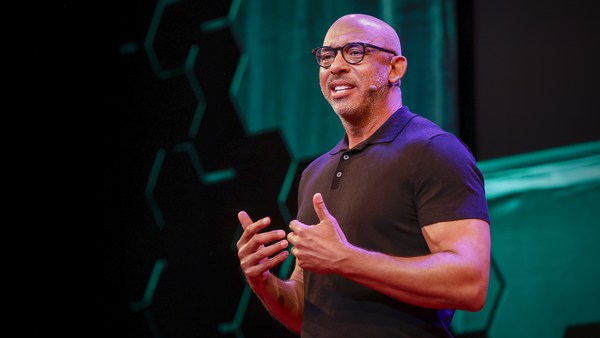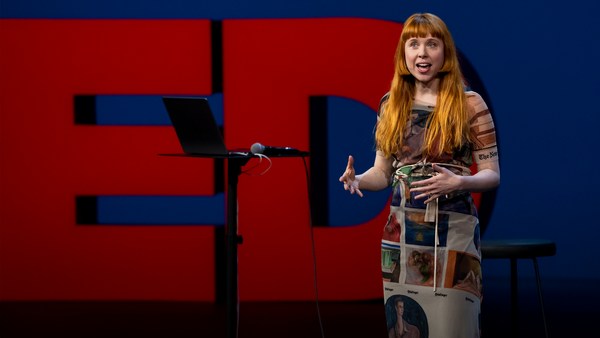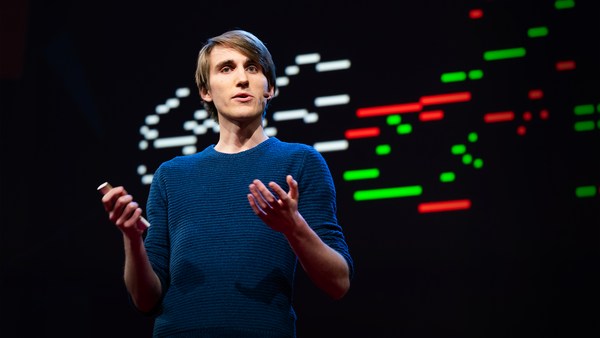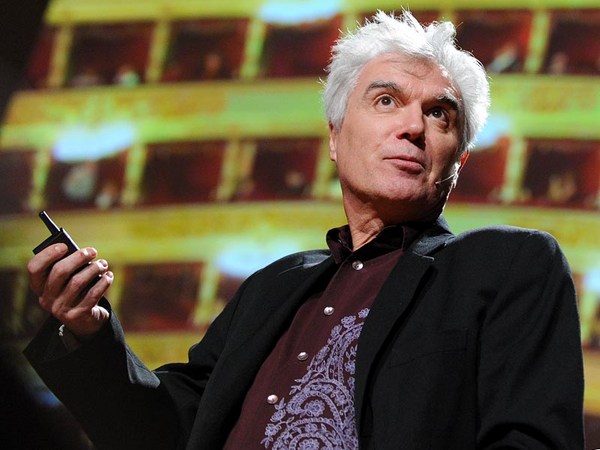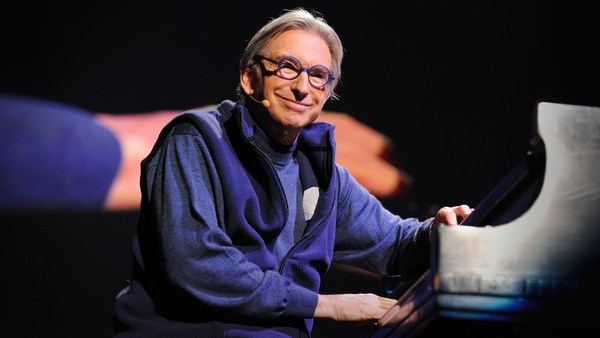I'll start today with some obscure music history. So if you're a David Bowie fan, you may already know this, but the chorus of the song "Starman" was actually borrowed from a 1937 blues song by T-Bone Fletcher, which I'm going to play you a clip of.
(Audio) There’s a starman waiting in the sky
He’d like to come and meet us
but he thinks he’d blow our minds
There’s a starman waiting in the sky
(Music ends)
Now I love Bowie's cover, but there’s just something about a beat-up guitar and an old man singing straight from the soul, that, to me, really gets to the emotion of the song. And I think what's most interesting is that I just made up that entire story. It was actually 100 percent AI.
(Laughter)
I apologize for lying, but there is a reason for it. I'd like to start with a question. What is real music? Now this is a question that’s come up with synthesizers, with sampling and hip hop music, even with the phonograph, when it first came out in the 1800s, people back then debated whether or not reproduced music was real music. John Philip Sousa, the Taylor Swift of his day, was not a fan. He said that phonographs were "a substitute for human skill, intelligence and soul.” ... "They reduce the expression of music to a mathematical system." It almost sounds like he's talking about AI, doesn't it?
So is AI real music? I believe that when it's in the hands of musicians, it can be. But first, let me give you some context for why I think that.
So I run a parody music social media channel called “There, I Ruined It.” This is just a -- thank you. This is just a weird evening hobby of mine. My day job is as an advertising creative director. But the purpose of the channel is to ruin music. Or, as I say, to lovingly destroy your favorite songs. And AI is one of the tools that I often use to do that. So, for example, here is my cover of the 50 Cent song "In Da Club" as performed by an AI version of country music legend Conway Twitty.
(Music)
You can find me in the club, a bottle full of bub
I'm into having sex
I ain't into making love
So come give me a hug
If you're into gettin' rubbed
Go shawty, it's your birthday
We’re gonna party like it’s your birthday
When I pull up out front
You see the Benz on the dubs
(Laughter)
Thank you.
(Applause)
So how did I create that song? The band you heard is actually a real band. In fact, that's me playing the fiddle. There's just one extra step in the process where I ran my vocals, my impersonation of Conway Twitty, through a custom AI voice model trained on his voice.
So to give you another example, along with a peek behind the curtain, in this next clip, you'll hear my actual voice followed by the post-AI version. And this is from a song that I call “The Red Hot Chili Peppers Make a Grocery List.”
(Music: Red Hot Chilli Peppers, “Can’t Stop”)
[My vocals] Quinoa, bananas, ravioli Canned tuna, pickles, macaroni [Anthony Kiedis (AI)] Quinoa, bananas, ravioli Canned tuna, pickles, macaroni
Now the David Bowie blues song I played for you in the beginning, that was actually created in a totally different way. That was 100 percent AI from a text prompt, which to me is a little more unnerving. In fact, when I first generated that song, it kind of messed with my head a little because I love old music, I perform music from that era, and to hear the pain in that man's voice, who never existed -- something about that just felt a little wrong to me. And that's why I lied to you guys up front. I suspect that some of you may have enjoyed that song up until the point you found out it was AI. And to me, that would imply that maybe there's more to music than the music.
So is music melody and rhythm and chords, or is music expression? And to a listener, does it always matter? If I hear a song I love on the radio, am I going to stop everything and research how that song was created? Maybe not.
It gets even messier when you look at the range of ways that AI can be used to create music. So, for example, what if I used AI to help with some song lyrics? Is that much different than, say, a rhyming dictionary? What if I used AI to create a new instrument sound that's never existed? Is that much different than a synthesizer? What if I trained an AI model on my entire body of work, and it created a new song in my style? Is that something I would put my name on? Or what if I wanted to use different voices like a guitarist can use different guitars? Or am I just stuck with the voice that I happen to be born with?
So I have a coworker with a great baritone voice, and he was very amused one day when I asked him if I could purchase his voice for a song that I was working on. So I'll play you a clip of that. So this is my singing through my coworkers voice, and it's the song "Baby Got Back," but set to the tune of "Hallelujah" by Leonard Cohen.
(Laughter)
(Music)
I like big butts, I cannot lie
You other brothers can't deny
When a round thing's in your face
you get sprung!
When a girl walks in you pull up tough
Cause you noticed that her butt was stuffed
My homeboys tried to warn me
Me so horny!
(Laughter)
(Applause)
I did enjoy just looking across the faces of this esteemed audience as that song was playing.
(Laughter)
I'll give you one more example. So in this next clip, you'll hear a melody I made up on my violin. And then I asked AI to turn that into a dramatic movie score.
(Real violin)
(AI dramatic violin)
(Music ends)
So all this to say, there are a million ways to use AI. The term AI music doesn't really clarify anything. And in fact, even our own lawmakers don't really seem to understand this. So there was a recent US congressional hearing on AI music where they played my mashup of AI Johnny Cash singing the song "Barbie Girl," to which Representative Matt Gaetz replied, "Robots should not be subject to free speech."
Now for the record, I am not a robot, but I do think this illustrates some of the confusion around this topic, which kind of leaves musicians like myself to come up with our own guardrails for how to use AI, what's right and what's wrong. And for me, it kind of comes down to three things. The first is, is it deceptive? Could somebody believe this is actually real? Next, is there artistic intent behind it? So if you're one of these people that's mass producing AI songs, hundreds of songs, and uploading them to Spotify, your intent is probably not artistic.
And then finally, how does this affect the musicians? And oftentimes, the victims of the songs that I create actually end up sharing those same songs on social media. So, for example, here's a clip of Snoop Dogg reacting to a mashup I made called "The Bare Necessities are Gin and Juice."
May I kick a little something
For the Gs and make a few ends
As I breeze through? Two in the mornin'
And the party's still jumpin' 'Cause my mama ain't home
I got bitches in the living room gettin’ it on
And they ain't leaving til six in the morning
So what you wanna do? Shit
I got a pocket full of rubbers, and my homeboys do too.
(Laughter and applause)
So when I see people like Snoop and Ed Sheeran and Nicki Minaj and others sharing these things, to me it's hopefully an indication that, in my own weird way, I'm using these technologies to contribute something new to the world.
And I think at the end of the day, even with all of the many downsides of AI messing with our music, I think a lot of artists are discovering the same thing I did, which is there are ways to use AI that can actually increase creativity. I think we could see new songs, new sounds, new styles that maybe we can't even imagine today. Much like it would have been hard for somebody like John Philip Sousa to have imagined this final monstrosity I'm going to play for you. This is a song that, when my wife first heard it, she said, "This is the stupidest thing I've ever seen."
(Laughter)
And this goes out to all the Nickelback fans.
(Music)
Look at this photograph
It’s a photo of a photograph
There’s another f**kin’ photograph
Because I photographed the photograph
So many photographs Makes me wanna take a photograph
I should probably hang that photograph
next to my photo of a photograph.
[Nickelback "The Phonograph"]
Look at this phonograph!
Every time I do, it makes me laugh!
Hear the sounds of the ragtime dance!
All the gals wanna get in my pants!
But back to that photograph
It reminds me of the photograph
(Before the photo of that photograph)
(When it was just a normal photograph)
(Music ends)
Thank you all so much.
(Cheers and applause)
